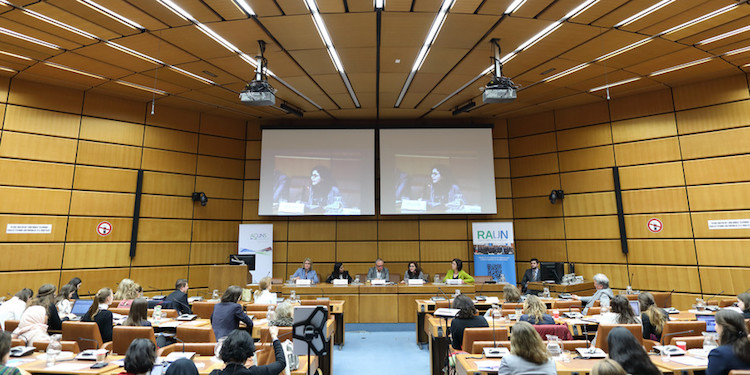By Julia Zimmerman*
This is the second in a series of reports on the Vienna UN Conference from January 10-12, 2018, which discussed actions and challenges linked to the Sustainable Development Goal 5 (SDG 5) and in the spirit of SDG 17. The Vienna Liaison Office of the Academic Council on the United Nations System (ACUNS) organized this Conference co-ordinated by Heather Wokusch. – The Editor
VIENNA (IDN) – When thinking of war and its inherent dangers, the first thought is probably death on the battlefield and the profound loss of human life that accompanies it; however, soldiers are not the only victims of war. Civilians are also greatly affected, and the impact can be especially devastating for women.
At the ACUNS UN Vienna conference, Ismail H. Balla, Chief of the United Nations Office for Disarmament Affairs (UNODA) Vienna Office, said it was incumbent upon the international community to address the systematic violence faced by women before, during and after conflict. He quoted Maj. General Patrick Gammaert, who as Deputy Force Commander of the UN Mission to the Democratic Republic of Congo in 2008 observed: “It is now more dangerous to be a woman than a soldier in modern wars and conflicts.”
In the face of contemporary wartime realities, Balla noted that international organizations, militaries, lawyers, and NGOs are working hard to change the status quo and to integrate women into conflict management, the military, and peace-building.
For example, Brigadier General Dr. Walter Feichtinger, Head of the Institute of Peace Support and Conflict Management at the Austrian National Defense Academy, is a champion of gender equality in the military. Speaking at the ACUNS conference, he emphasized that times have changed: “Women in the military are the new normal nowadays in the Austrian army.”
In fact, Austria started integrating female soldiers as early as twenty years ago and women now compose roughly 600 of the 15,000 total troops. Brigadier Feichtinger sees the National Defence Academy as a role model to other institutions on how to change mindsets on values such as gender equality. He noted that in working towards the elimination of conflict-related sexual violence and restoring peace, the inclusion of female leaders in both military operations and peace processes is crucial: “Women are an integral part of comprehensive security and also their thinking and perceptions.”
Karuna Parajuli, Nepalese lawyer and a graduate of UNODA’s Women Scholarship for Peace: Global South program, is also adamant about the importance of increasing the role of women in post-conflict peace negotiations. In Nepal, she works with local NGOs to offer free legal representation to women who have been victims of conflict-related violence.
The armed conflict in Nepal (1996-2006) left behind many women victims of violence, particularly sexual violence. In working with these victims, Parajuli is faced by the challenge that women are still very afraid to speak openly about their experiences, even after many years. In Nepal, as in many other countries, sexual violence is heavily stigmatized, causing victims to fear negative societal repercussions for sharing their stories.
Ingeborg Geyer, Zonta International‘s UN Representative in Vienna, further highlighted the use of sexual violence, particularly rape, during conflict. Emphasizing that rape is one of the most pervasive and detrimental acts related to war, Geyer noted that its aftermath can have grave consequences for women and societies. In addition, the extent and intensity of rape during conflict can cause severe health conditions such as vaginal fistula.
Human trafficking is another danger faced by women during times of war. Jean-Luc Lemahieu, Director of the Division for Policy Analysis and Public Affairs at the UNODC (United Nations Office on Drugs and Crime), has worked to shed light on the issue of human trafficking through the organization’s Blue Heart Campaign. He indicated that 71% of all trafficked human beings are women, adding that human trafficking is often used to generate income in impoverished economies during times of conflict.
Moving forward, it is clear that in tackling sexual violence, human trafficking and other gender-related issues connected to conflict and war, the 3P paradigm is crucial: prevention, protection, and prosecution. Increasing women’s role in political leadership is also important. As Parajuli pointed out, Nepal’s Parliament now has 33% women, a great achievement.
As an alumnus of UNODA’s Women Scholarship for Peace: Global South program, Parajuli received in-depth training on key conceptual and practical aspects of disarmament and development-related issues. As noted by UNODA’s Vienna Chief Balla, such training is part of the coherent, coordinated and context-specific response necessary to enable young people such as  Parajuli to be important catalysts for change, as they challenge impunity and pursue justice for women in the context of war and conflict.
Parajuli to be important catalysts for change, as they challenge impunity and pursue justice for women in the context of war and conflict.
*A graduate student at Webster Vienna Private University, Julia Zimmerman is writing her Master’s Thesis on how foreign military intervention impacts sexual violence towards women during conflict. She recently interned with the NGO CARE on a project working to end child marriage in Bangladesh and Nepal. She is passionate about combating gender-based violence globally. [IDN-InDepthNews – 26 January 2018]
Photo: A general view of the Vienna UN Conference. Credit: Robert Bosch AG/APA-Fotoservice/Schedl
IDN is the flagship agency of the International Press Syndicate.
Facebook.com/IDN.GoingDeeper – twitter.com/InDepthNews

